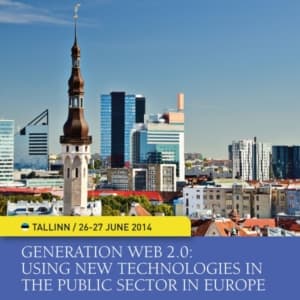 About the symposium
About the symposium
“This digital revolution is drastically changing the world. Public administrations are keeping up with the trend by constantly adapting their online service supply in order to stay in close touch with the users.”
Emilio Fatovic, President of Europe Academy
By engaging CESI’s Trade Councils for Security, Health and Education, the seminar covered new technologies in Europe’s public sector. The seminar took place in Tallinn, Estonia from 26-27 June 2014. An advanced country in terms of new technologies with 78% of the population using the internet and 75% households with internet access, Estonia provided the ideal backdrop for debate. With the Estonian Minister for Economic Affairs and Communication, Urve Palo, opening the seminar, the e-State in Estonia gave an insight into how new technologies can be used in the public sector.
The project aimed to uncover best practices in these new developments and allowed members to share their experiences of the changes that have occurred for public sector workers as a result of new technologies. A booklet to exchange best practices and a charter of recommendations will soon be published.
The Symposium’s Programme and Speakers’ List can be read in EN, FR and DE.
FINAL BROCHURE with a Charter of principles for the participative and responsible inclusion of workers in the set-up and use of ICT in the public sector in Europe: EN, DE, FR, ES, IT
Presentations/Speeches
Emilio Fatovic, Europe Academy President, Opening address
Franco Accordino, European Commission on Connecting people to policy making: the Futurium experiment
Françoise Berthoud, Directrice du Groupement EcoInfo on Are dematerialising procedures always a good thing?
Miquel Estapé, Open Administration of Catalonia Consortium on Open Administration for Businesses in Catalonia
Carlos Fernandez Guerra, Responsible for social media for the Spanish National Police on Servicio público 2.0
Elisabeth Grosdhomme Lulin, Director General, Paradigmes et caetera on Web 2.0: The users contribute to the improvement of public services
Ralf Martin, Project Manager, Central Data Processing of financial management Koblenz on The European IT skills passport
Arthur Mickoleit, OECD on Digital Government: OECD policy recommendation and the role of social media
Sergejus Muravjovas, Executive Director, Transparency International Lithuania on Action Tank’s Perspective on New Technologies
Rauna Nerelli, Ministry of Justice, Finland on e-participation and transparency in the decision making process
Robbie Parish, Scottish Government on Digital Scotland
Elena Vio, Arsenàl.IT Veneto’s Research Centre for eHealth Innovation on Example of the way new technology is used in the field of health
Ioannis Yallouros, European Disability Forum, Executive Committee Member, Use of ICT for a better service for users with a disability


